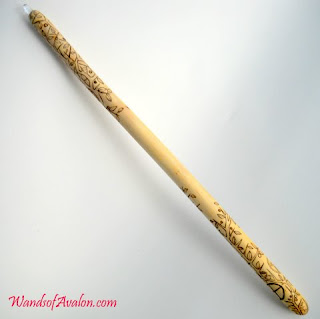On a number of different forums and places, I always see this question: "Can you recommend some good books for me? I'm just starting out!" Now, let's face it....there are loads of absolutely terrible books out there purporting to be about Wicca and Witchcraft, and it's not always easy to find solid material written by solid authors. So, I thought I 'd put together a list of MY favourite books, which I wouldn't recommend only to the beginner, but to anybody who wants to deepen their knowledge of the Craft, in whatever path they follow it in. I've arranged them into the categories of "Wicca;" "Witchcraft," and "Magic." Hope you enjoy!
About Wicca:
"High Magic's Aid" and "The Meaning of Witchcraft" by Gerald Gardner. The guy who more or less "started it all" when it comes to the modern Wicca movement. Learn about Wicca from the founder. May come as a shock to people reared on the more sanitized, watered-down books published recently.
"The Rebirth of Witchcraft" by Doreen Valiente. My favourite magical author, this book contains info not only about Wicca, but about Trad Craft and Cochrane's Clan as well. Highly recommended.
"The Witches Bible" by Janet and Stewart Farrar. Some slightly homophobic sounding statements are a little off-putting, but this is a good picture of Alexandrian-based Wicca and includes 3 books in 1, with great info about the Sabbats and the Gods.
"Modern Wicca" by Michael Howard. The backstory of Gardner and some of the other early leaders in the Wicca and Witchcraft movement.
About Witchcraft:
"Witchcraft for Tomorrow." Another Valiente favourite. Kind of a blend of Trad Craft (I've seen her words and consecrations used in other Trad Craft books...without being credited as such) and Wicca, but geared towards a more solitary path. Probably the first to allow for "self dedication" (which is allowed for the practice of Pagan Witchcraft; you cannot self "initiate" into Wicca.) Chock full of the author's wonderful poetry and rites, and contains a "Book of Shadows" which is a great place to get started.
"The Call of the Horned Piper" by Nigel Jackson. Interesting, if a bit "wordy" take on Traditional Witchcraft. Some very interesting imagery and rites, as well as an exercise based on Sabbatic flight.
"Treading the Mill" by Nigel Pearson. Much more "hands on" than "The Call" listed above. Good trance techniques and some info on oils and wine-making. Definitely low-magic based.
"Mastering Witchcraft" by Paul Huson. This one makes a lot of the New Age types tear out their hair, but it's really an amazing resource. Provides a much more realistic, organic view of Witchcraft from before Wicca and such became a pop culture fad. Definitely has some dark material, but this is a plus instead of a minus in my opinion. Take what you need from it, but at least respect what it has to offer.
About Magic:
"The Encyclopedia of 5,000 Spells" by Judika Illes. The book I WISH I'd had years ago. Spells for everything, from almost every tradition. Definitely perfect for the modern Witch; you won't find a lot of fluffy, love-and-light stuff here. Does include hexes and curses, which can be justified in certain cases.
"The Complete Book of Oils, Incenses, and Brews" by Scott Cunningham. This poor guy gets WAY too much hate from people who often don't even bother to read his work. This book, along with "Magical Herbalism" and "Earth Power" are all wonderful compendiums of recipes and spells using herbs, essential oils, and the like. I use a lot of his incense and oil recipes, and love them. Highly recommended.
Anyway, hope you all enjoy these and find them useful! I'll be adding to the list as I dig through my books and find ones I might have forgotten.
 My friend Mr. B came to visit me, and since we both like herbs, essential oils, and natural living, we decided to make some home-made lip balm, from a recipe we found at Mountain Rose Herbs. We used the one called "Peppermint Cocoa Lip Balm" but made a few small changes to the ingredients. Here's what we ended up using:
My friend Mr. B came to visit me, and since we both like herbs, essential oils, and natural living, we decided to make some home-made lip balm, from a recipe we found at Mountain Rose Herbs. We used the one called "Peppermint Cocoa Lip Balm" but made a few small changes to the ingredients. Here's what we ended up using:








